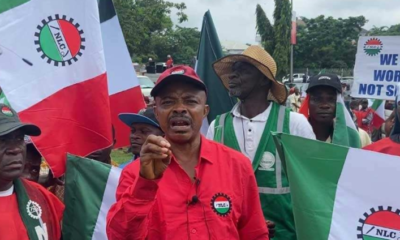A young Nigerian lady identified as Odunayo Eniola Isaac, who is a victim of human trafficking, has cried out for help, seeking to be returned to Nigeria from Iraq where she was trafficked to.
Isaac, who hails from Osun State in South-West Nigeria, narrated her harrowing experience through a human rights advocacy organization, Hopes Haven Foundation, saying she was a victim of human trafficking perpetrated by a lady also known as Mama Uganda, who deceitfully transported her to Iraq with promises of a better life.
Odunayo said having endured almost two years of inhumane treatment, brutal physical torture, and degrading dehumanization at the hands of her Iraqi employer known as Saba Akram, and his family, her emotional and psychological well-being has been severely compromised.
The Hopes Haven Foundation, which further escalated Odunayo’s story on Wednesday, said she decided to raise the alarm after she has been overwhelmed with despair and desperation, and called on Nigerian authorities to facilitate her urgent return to Nigeria, lest she loses her life.
“Odunayo has conveyed the depth of her desperation, stating that if she remains in Iraq for even a short period longer, her very existence will be under threat,” the foundation said.
“Odunayo was trafficked to Iraq a year and 10 months ago through an Iraqi agency identified as Blend Warani, with a promise of a job opportunity.
“According to her story, she left Nigeria in February 2023 to work as a domestic help in Iraq. Upon her arrival in Iraq, Odunayo was subjected to deplorable and inhumane working conditions, characterized by excessively long work hours of up to 20 hours daily.
“The situation was further exacerbated by the constant and severe physical torture reportedly inflicted upon her by her employer, Saba Akram, and his wife. The couple’s brutal tactics allegedly included the use of tasers and metal rods to inflict physical harm and intimidate Odunayo into submission.
“In addition to the physical abuse, Odunayo was also subjected to emotional and psychological torment. She said her employer seized her phone, effectively severing her connection with her family and friends. This deliberate isolation prevented her from communicating her distress and pleas for help to anyone who could potentially intervene on her behalf.
“According to her, in July 2023, her employer falsely accused her of running away, despite the fact that she was being held captive in the house and subjected to relentless torture and death threats.
“According to her:
“I was locked inside the house where I was working and my phone was seized. They seized my passport and all my clothes and everything,” she lamented.
“I was constantly beaten with iron rods and I was always made to work from 6am to 3am or 4am the following day. I hardly sleep for more than three or four hours daily.”
“Following the false accusation of attempting to escape, the employment agency, Blend Warani, reportedly refunded the employer’s payment, abandoning Odunayo to her plight. Despite her prolonged suffering, Odunayo had not received any salary since commencing her employment in February 2023.
“Determined to locate their missing loved one, Odunayo’s family embarked on an extensive search. Their efforts eventually led them to contact Hopes Haven Foundation in October 2023. Upon launching an investigation, the foundation discovered a disturbing video circulating on WhatsApp groups, showcasing Odunayo in a state of distress.
“Further inquiry by Hopes Haven Foundation revealed that Odunayo had mustered the courage to report to a police station in Iraq, where she filed a complaint detailing her harrowing experiences of maltreatment, torture, and kidnapping.
“Odunayo said that she has suffered broken fingers, and endured restricted freedom, and severe physical and psychological trauma.
“My madam was beating me as she did all the time and when she left to get hot water to pour on me, I managed to escape and ran to the police station,” she said.
“I have been at the police station since last Wednesday when I escaped. Alhaja Shakira was the one who helped me connect to my sisters to tell them what is happening. She (Shakira) also promised to bring her lawyer to help me but I have not seen her since then.
“She always locked me inside and beat me with an iron rod. There is nothing they did not do to me. In fact, they wanted to kill me. They locked me inside the house and claimed that I was fine.
“I want to go back home (Nigeria) but my employer has my passport and all my belongings and for the past one year and 10 months that I have worked for them, they have not paid me anything at all.”
The Foundation said they have written to the National Agency for the Prohibition of Trafficking in Persons (NAPTIP), and the Chairman of the House of Representatives Committee on Diaspora, Hon. Tochukwu Okere, for urgent intervention in Odunayo’s case.
In its letter sent to the Director General of NAPTIP, the organization said:
“We are deeply outraged that a Nigerian citizen, in pursuit of a livelihood, was subjected to such gross violations of human dignity and labor rights.
“We hereby appeal to your esteemed office to: Ensure the recovery of all salaries owed to Odunayo and demand compensation for her medical expenses and the psychological damage caused by this ordeal.
“Hold the employer accountable for torture, false allegations, and other violations of human rights and labor laws.
“Facilitate the safe return of Odunayo to Nigeria to reunite her with her family and provide necessary support for her reintegration.”
“This matter underscores the urgent need to strengthen protections for Nigerian citizens seeking employment abroad and ensure justice for victims of trafficking and labor exploitation,” it further noted.
“We trust in NAPTIP’s commitment to protecting Nigerian lives and dignity, and we stand ready to provide further details or support your investigations in this case.”

 Tech21 hours ago
Tech21 hours ago
 VenturesNow1 day ago
VenturesNow1 day ago
 Politics1 day ago
Politics1 day ago
 VenturesNow1 day ago
VenturesNow1 day ago






























